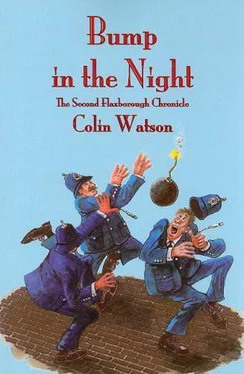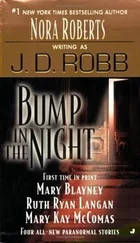Kebble beamed, but about his eyes was a flicker of inquisitiveness. “What do you want, a list of the places of interest?”
“I have my own list, as a matter of fact. For what it’s worth. I was wondering if you could give me a few directions, though.”
“You don’t want to bother Larch?” Kebble was still smiling.
“Well, I feel that would be somewhat ungracious of me. He’s a busy man, is your chief inspector.”
“Yes, isn’t he?” Kebble sighed and took a slow drink. “All right, then; tell me where you want to go?”
Purbright revolved his glass on the smooth oak table top and eyed the dark, frothless column of beer. It was a sweet, oily local brew that soothed rather than stimulated. “For a start,” he said, “I should like to take a trip into the past life of the gentleman on whose body Mr Chalice has just conducted his admirable inquest.”
“So that’s the sort of tour you’re on, is it?” Kebble had started to clean his nails with a little pearl-handled pen-knife that hung from his watch-chain, and his voice seemed to come through the folds of his chin and neck.
“Idle curiosity,” said Purbright. “This Biggadyke must have been quite a practical joker.”
Kebble chuckled. “They tell me it was Stan who got in here one night after closing time and sawed all the handles off the beer pumps.” He ruminatively surveyed the results of his manicure. “Then there was the beetle, of course. But you’ll have heard about that.”
“Beetle? No, I don’t think so.”
Kebble looked up. “Good lord! Haven’t you really?” He brushed shut the little penknife across his palm. “I thought everyone knew about the Broadbeck beetle. Broadbeck—do you know where that is?”
Purbright shook his head.
“Never mind; it’s a small village just outside the town. Biggadyke’s house is there, next to the parish hall. The hall’s a scruffy little place, but the rural district council has always used it for meetings and about three years ago they had an outside lavatory built—R.D.C. meetings are liable to go on all day, you know. Big was fearfully annoyed because they put the thing bang up to the edge of his garden, but there wasn’t anything he could do about it.
“Of course the councillors were like kids with a new toy to begin with. Even after two or three months it still seemed to fascinate them. They kept popping in and out of council as if they didn’t trust each other not to pinch the damn thing.
“It would be about the fourth monthly meeting after it was built that I could see something queer had happened. The councillors were taking it in turn as usual to slope off when things got a bit dull and I happened to notice one of them come back looking pale and worried as hell. Then another tottered in a bit later in the same state. I kept an eye open after that and damn me if five or six didn’t come back looking as if they’d seen a ghost.
“When the meeting was over, I thought they’d all get together and talk about whatever had happened outside. But they just shot off home without a word. Actually avoided one another. You’d have thought they’d just been tipped off that the bailiffs had called for the telly.”
Kebble drank some of his brandy and water, glanced solicitously at the level of Purbright’s beer, and went on: “I couldn’t draw as much as a whisper for weeks afterwards. Then quite unexpectedly I got the whole story. It was the R.D.C. medical officer who told me.
“What put him on to it in the first place was the way one or two doctors in town pulled his leg. A bright lot you’ve got on that council of yours, they said to him. How do you mean, he said. Well, they said, half of ’em came rushing round to surgery the other night begging for confidential check-ups.
“The M.O. was tickled to death, naturally. He cornered one of the councillors he was fairly friendly with and wormed the truth out of him. The bloke admitted he’d thought something horrid was wrong with him because when he left the hall and began to pass water he got the most terrible burning and tingling sensation. He hadn’t told anyone, except his doctor, because that wasn’t the sort of thing he’d like spread around. He certainly didn’t know that half the other fellows on the council had had exactly the same experience.”
The editor paused to salute benevolently some new arrival in the tap room. Then he leaned further towards Purbright.
“Suppose,” he said, “that you saw some insect or fly or something on the white porcelain of a urinal stall. Your natural instinct would be to try and flush it down, wouldn’t it? I doubt if you or anyone else would be able to resist it. Well, what the M.O. found when next he was round at the village hall was a little beetle, oh, about that long”—he held up finger and thumb—“just where it would be most tempting.” Kebble gazed admiringly into the middle distance. “He showed it to me; it was beautifully made.”
“Copper?” ventured Purbright. “Soldered to a wire?”
Kebble seemed not to resent the expert short-circuiting of his tale. He smiled dreamily. “Aye, that’s it. And a hole drilled right through, of course. They spotted the battery and the coil, or whatever it was, under Biggadyke’s hedge.” After a while he added: “Bloody good job he didn’t use the mains, wasn’t it?”
Purbright stared out of the window and watched the moving finger of a mast beyond the yard walls and outhouses. “Tide time,” he murmured, obedient already to platitudinous custom.
“Aye,” agreed Kebble. He shuffled off to the bar to buy more drinks.
When he returned the inspector invited him to give further details of Biggadyke’s history, adding that he would accept the playful character of the man without more illustration.
Kebble obliged with the facility of one long drilled in obituary composition.
“Let’s see, then,” he began. “He was about forty-eight years old and a native of the town. He went to the Grammar School until he was asked to leave after some trouble with a girl. Big was always a pretty forward lad, which is odd in a way because he was absolutely hideous as a kid and didn’t improve much as he got older. Never mind, he left school and went straight into his uncle’s haulage business. He played around for six or seven years, landed a few more girls into trouble, drank a lot of ale, joined the Rowing Club—you know the sort of thing. Then the old uncle crumbled: they tell me he took to writing backwards, you know. Anyway, he didn’t last long after that and Big got the firm.
“He was no mug, mind. He knew the business by then and soon started to lay in the cash. Big had more sense than to pay for his wild oats out of capital; wine and women were for after office hours. In those days, at least; he relaxed a bit during the war when he was making more money than he knew what to do with. Of course, the business saved him from being called up.
“When did he get married, now? Oh, it must have been just after the war, 1946 maybe. His missus used to be one of the Jackson girls. Pretty, simpering little thing. I’ll bet you didn’t hear any girlish giggles from her today, though. She’s spent the last ten years cooped up on her own in that whopping great ideal home exhibition out at Broadbeck. Big only used the place for sleeping, and not every night either.”
“Any children?” Purbright asked.
The editor shook his head. Then he picked up his tankard and stared into it, tipping it slowly from side to side. “There’s not much else I can tell you. As a matter of fact, the fellow was rather a dull number when you get down to a straight life story. We’ve quite a few of the same kind here. Not quite old enough to hoard their pennies and become respectable, but too old to play the fool without getting everybody’s back up. You’d never believe the number of bald heads and pot bellies among that Rowing Club mob. One heave at an oar and they’d drop dead. It’s all tankards and totty-tickling, old chap. Bloody desperate, if you ask me.”
Читать дальше












